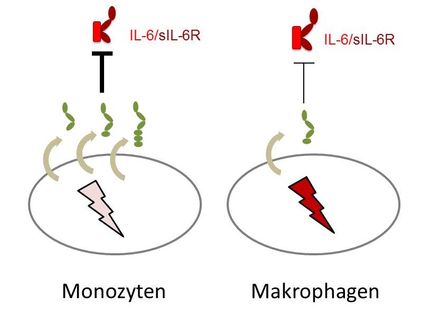A Full Pipeline of Follow-on TNF-Antagonists
The US$ 7.6 bln market of TNF-antagonists attracts numerous follow-on compounds
Advertisement
The Business Intelligence firm La Merie S.L. reported that the huge market of US$ 7.6 bln in 2005 and the clinical validation of the target in many inflammatory indications has filled the pipeline of follow-on TNF-antagonists. Sales of the three marketed TNF antagonists etanercept, infliximab and adalimumab grew by 42, 18 and 64 %, respectively, in 2005 and are expected to further grow due to thestill expanding number of approved clinical indications of inflammatory diseases including rheumatoid arthritis and inflammatory bowel diseases. At least six follow-on TNF antagonists are in clinical development and more than 16 projects in preclinical stages. Apart from antibody-based constructs, other technologies such as small molecules, vaccines, proteins, gene therapy, RNAi make use of the validated target in an attractive market to validate their technology at low development risk. These results and more were found in a competitor analysis conducted by La Merie Business Intelligence.
The range of indications for which at least one of the three branded TNF antagonists obtained approval ranges from rheumatoid arthritis (RA), juvenile RA, psoriatic arthritis, ankylosing spondylitis, Crohn's disease (CD), pediatric CD, ulcerative colitis and psoriasis. Further inflammatory indications such as asthma are under evaluation. The most advancedclinical stage follow-on TNF-antagonist are human or humanized/optimized antibodies in order to reduce the immunogenicity risk seen with chimeric molecules. Small molecules as selective or dual TNF antagonists also have reached clinical evaluation.
The preclinical pipeline of TNF antagonists consists of molecules derived from new technologies or molecules exploring other strategies such as vaccination or oral delivery. Engineered proteins and antibodies make up most of the pipelineattempting to develop and validate the respective technology by using a validated target in an attractive market.
Most read news
Other news from the department business & finance

Get the life science industry in your inbox
By submitting this form you agree that LUMITOS AG will send you the newsletter(s) selected above by email. Your data will not be passed on to third parties. Your data will be stored and processed in accordance with our data protection regulations. LUMITOS may contact you by email for the purpose of advertising or market and opinion surveys. You can revoke your consent at any time without giving reasons to LUMITOS AG, Ernst-Augustin-Str. 2, 12489 Berlin, Germany or by e-mail at revoke@lumitos.com with effect for the future. In addition, each email contains a link to unsubscribe from the corresponding newsletter.
Most read news
More news from our other portals
See the theme worlds for related content
Topic world Antibodies
Antibodies are specialized molecules of our immune system that can specifically recognize and neutralize pathogens or foreign substances. Antibody research in biotech and pharma has recognized this natural defense potential and is working intensively to make it therapeutically useful. From monoclonal antibodies used against cancer or autoimmune diseases to antibody-drug conjugates that specifically transport drugs to disease cells - the possibilities are enormous

Topic world Antibodies
Antibodies are specialized molecules of our immune system that can specifically recognize and neutralize pathogens or foreign substances. Antibody research in biotech and pharma has recognized this natural defense potential and is working intensively to make it therapeutically useful. From monoclonal antibodies used against cancer or autoimmune diseases to antibody-drug conjugates that specifically transport drugs to disease cells - the possibilities are enormous
Topic world Gene therapy
Genetic diseases once considered untreatable are now at the center of innovative therapeutic approaches. Research and development of gene therapies in biotech and pharma aim to directly correct or replace defective or missing genes to combat disease at the molecular level. This revolutionary approach promises not only to treat symptoms, but to eliminate the cause of the disease itself.

Topic world Gene therapy
Genetic diseases once considered untreatable are now at the center of innovative therapeutic approaches. Research and development of gene therapies in biotech and pharma aim to directly correct or replace defective or missing genes to combat disease at the molecular level. This revolutionary approach promises not only to treat symptoms, but to eliminate the cause of the disease itself.




















































